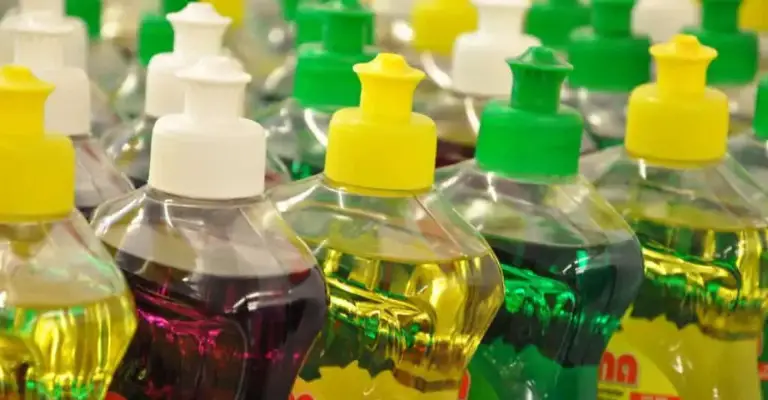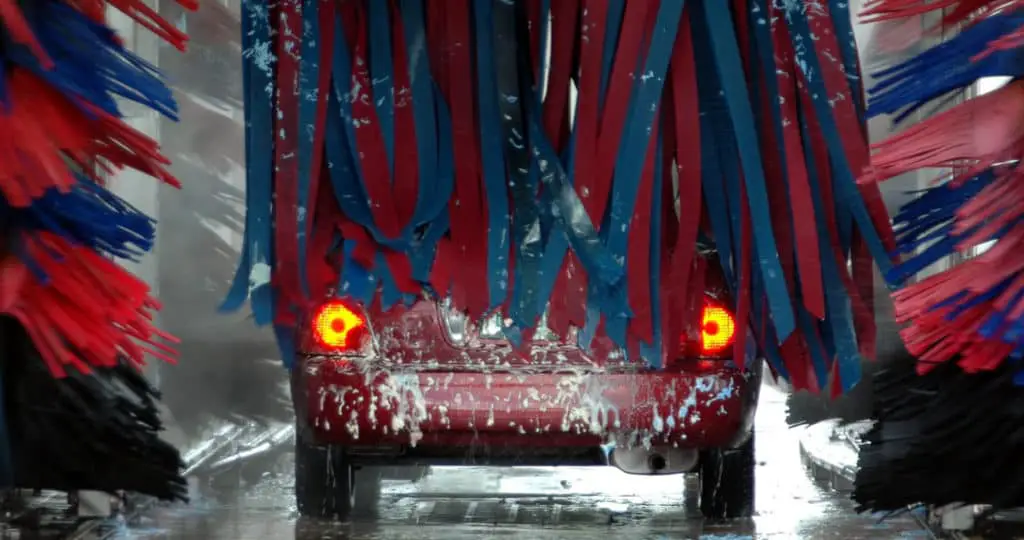- How to Clean Car Carpets Quickly (Without An Extractor) - July 10, 2024
- Can You Touch Up Clear Coat On A Car? Yes and No (Here’s Why) - November 25, 2023
- How To Wax A Car By Hand (For Beginners) - November 14, 2023
Last Updated on March 19, 2025 by Nate Schnell
If you’ve ever found yourself staring at a bottle of Dawn dish soap wondering, “Can I use this to wash my car?” you’re definitely not alone. Dawn is fantastic at cutting through grease, making it seem like an easy solution for removing dirt and grime. But does that mean it’s safe to use regularly on your car’s paint? Let’s dive into what using Dawn dish soap really does to your vehicle and when it might be appropriate.
Is Dawn Dish Soap Safe for Car Paint?
This is probably your biggest concern. Dawn dish soap isn’t going to destroy your car’s paint after one or two washes, but it’s not the ideal solution for regular cleaning either. The reason Dawn is effective for dishes is the same reason it can pose issues for your car: its powerful degreasing properties.
When you wash your car with dish soap, you aren’t just removing dirt. You’re also stripping away the protective wax layer designed to shield your paint from harmful UV rays, water spots, and environmental contaminants. While an occasional wash with dish soap won’t immediately damage your paint, repeated use can leave your car’s finish exposed, dull, and vulnerable to deterioration.
If your goal is simply to clean away grime, dirt, or oil temporarily before reapplying a fresh coat of wax, Dawn can be effective as a one-time solution. However, for regular washes, it’s best to stick to products specifically designed for automotive use.
What Actually Happens When You Wash Your Car with Dawn?
Dish soap excels at lifting and removing contaminants due to its strong degreasing ingredients. But let’s break down exactly what it’s doing when you use it on your vehicle:
First, it effectively removes grime, oil, grease, and stubborn stains—this is its primary strength. Unfortunately, that same degreasing action also strips off the wax or sealants you’ve applied to protect your car. Without this protective wax layer, the paint becomes vulnerable to UV damage, acid rain, bird droppings, and other harmful elements.
Long-term use of Dawn, therefore, can lead to a visibly dull finish and even premature clear coat failure, ultimately diminishing the value of your vehicle. To maintain the shine and protective qualities of your paint, it’s crucial to use an automotive-specific soap regularly.
Can Dawn Dish Soap Damage Ceramic Coatings?
If you’ve invested in a ceramic coating, you know how effective it is at repelling water, dirt, and contaminants, making your car easier to clean and maintain. While ceramic coatings are more durable than traditional wax, they still require careful maintenance.
Short-term use of Dawn won’t strip a ceramic coating outright, but repeated use will weaken its hydrophobic properties. Essentially, it’ll reduce the effectiveness and lifespan of the coating, meaning your expensive investment won’t last as long as it could.
Instead, opt for a pH-neutral soap formulated specifically for ceramic-coated vehicles. This preserves the coating’s effectiveness and ensures you get the most out of your investment.
Dish Soap and Paint Protection Films (PPF)
If your car has a paint protection film (PPF), dish soap isn’t your best choice. Although the PPF itself is tough, its topcoat is designed to maintain gloss and resist UV damage. Regularly using Dawn dish soap can gradually erode this topcoat, reducing its protective and aesthetic properties.
Instead, stick with a gentle car shampoo recommended by your PPF installer to extend the film’s life and appearance.
When Is It Actually Okay to Use Dawn Dish Soap?
While regular use isn’t recommended, there are a few specific cases where Dawn dish soap can be your ally. For instance, if you’re preparing your car for a fresh wax application, a wash with dish soap can remove old wax layers effectively. Similarly, for stubborn messes like sap, bird droppings, or greasy residues, dish soap can serve as an effective one-time cleaning solution.
Just be sure to follow up with a quality wax or sealant immediately afterward, restoring the protective layer stripped by the soap.
When Should You Absolutely Avoid Using Dish Soap?
You should definitely avoid dish soap if:
- Your car has recently been waxed, sealed, or coated, and you want to preserve that protective layer.
- You’re cleaning your car weekly or very frequently, as the soap’s harsh properties can lead to cumulative damage.
- Your car has delicate rubber and plastic trim, which can become dry and brittle over repeated exposure.
Using dish soap repeatedly on these materials can cause noticeable fading, discoloration, and even cracks, resulting in costly repairs or replacements.
The Pros and Cons: Dish Soap vs. Car Wash Soap
Let’s take an honest look at the benefits and drawbacks of using dish soap:
Pros:
- Easily removes tough stains, grease, bird droppings, and tree sap.
- Cost-effective and widely available.
- Good for prepping your car for a new wax or coating.
Cons:
- Strips protective waxes, sealants, and coatings.
- Can dry out and discolor plastic or rubber trim over time.
- Leads to a dull, less vibrant finish when used repeatedly.
While it’s useful occasionally, these cons illustrate why dish soap isn’t ideal as a go-to car wash solution.
Does Dish Soap Harm Plastic and Rubber Components?
Unfortunately, repeated washing with dish soap can negatively affect your car’s plastic and rubber components. The strong cleaning agents found in dish soap can dry out these materials, causing discoloration and brittleness. Over time, this can lead to cracks and fading, which can prematurely age your vehicle’s appearance.
To keep plastic and rubber trim healthy and looking new, always use products specifically designed for automotive plastics and rubber.
What’s the Best Alternative to Dawn Dish Soap?
The ideal alternative is a high-quality automotive shampoo designed to safely remove dirt without damaging your protective wax or coatings. Car-specific soaps are pH-neutral, formulated to gently lift away grime, and protect your car’s finish. Many brands like Meguiar’s, Chemical Guys, or Turtle Wax offer excellent products that clean effectively while preserving your car’s wax and clear coat.
Look for soaps that produce thick foam, as these lift dirt from the surface, reducing the chances of scratching. Also, consider purchasing a soft microfiber wash mitt and microfiber drying towels to enhance protection against swirl marks.
How Often Should You Wax Your Car if You Wash with Dish Soap?
If you have used dish soap on your vehicle, it’s important to wax it afterward. Wax replenishes the protective coating that was removed, preventing future damage from UV rays and contaminants. As a rule of thumb, waxing your car every three to four months is recommended, but if you frequently use harsh soaps (like Dawn), you may need to re-wax more often—every two months or so—to keep your car fully protected.
Is Dish Soap Safe for Car Interiors?
Dish soap should generally not be used on car interiors. The chemicals intended for breaking down oils can damage sensitive surfaces inside your car, such as leather, vinyl, and upholstery. Instead, choose a product designed specifically for car interiors, ensuring that your dashboard, seats, and trim stay moisturized, vibrant, and crack-free.
Final Thoughts: Should You Use Dawn Dish Soap on Your Car?
Using Dawn dish soap occasionally isn’t going to destroy your car’s paint immediately, but it should definitely be reserved for special circumstances, such as removing tough contaminants or stripping old wax. For regular washes, the safest bet is to use a dedicated automotive shampoo that protects your paint, clear coat, wax, ceramic coating, or paint protection film.
A high-quality car soap provides the best of both worlds—it cleans effectively and safely, leaving your car glossy, protected, and looking showroom-ready. Investing a little extra in a proper car wash soap pays off in the long run by maintaining your car’s value and appearance.
Remember, a car wash isn’t just about removing dirt—it’s about protecting your investment for years to come.



